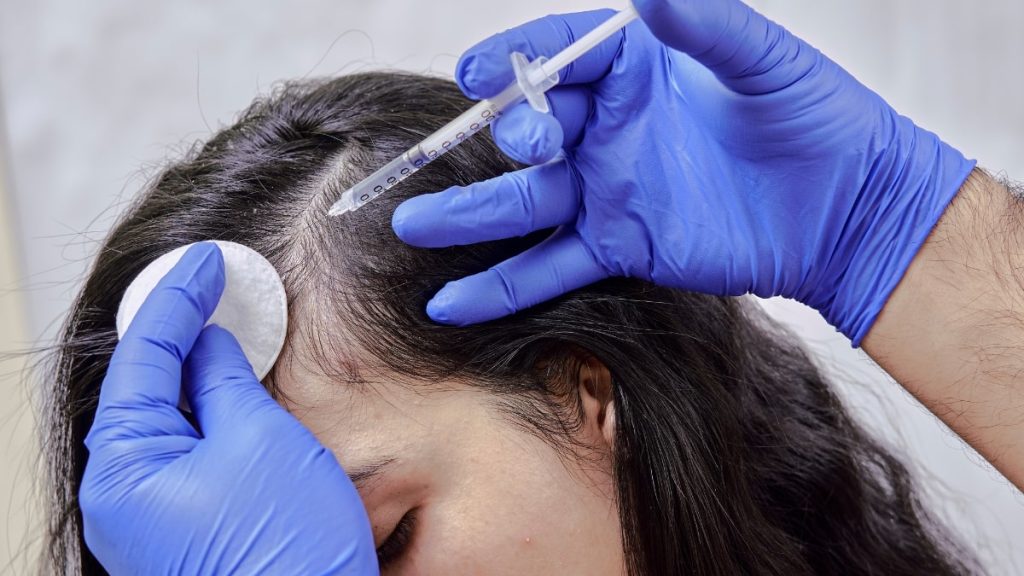Hair loss can be a distressing experience for many people. Whether it’s due to genetics, stress, or other factors, losing hair can affect your confidence and self-esteem. But don’t worry, there are solutions available that don’t involve surgery. In the UK, non-surgical hair loss treatments are becoming increasingly popular. But are they right for you? Let’s dive into the options and see what might work best for you.
What Are Non-Surgical Hair Loss Treatments?
Non-surgical hair loss treatments are methods to help you keep or regrow your hair without going under the knife. These treatments can include topical solutions, laser therapy, and even injections. They are generally less invasive, have fewer side effects, and require less recovery time compared to surgical options.
Types of Non-Surgical Hair Loss Treatments
- Topical Treatments
- Minoxidil: This is a popular over-the-counter treatment that you apply directly to your scalp. It helps to stimulate hair growth and slow down hair loss. According to Philip Kingsley, a well-known trichologist, “Non-surgical hair loss treatments can be highly effective, especially when started early. Treatments like topical minoxidil have shown promising results in many of my clients” (Vogue UK).
- Laser Therapy
- Low-Level Laser Therapy (LLLT): This involves using laser light to stimulate hair follicles. It’s a painless procedure that you can do at home with a special comb or cap. Dr. Alan Bauman, a hair restoration physician, says, “Non-surgical treatments are a great first step for those experiencing hair thinning. They can delay the need for surgical intervention and, in some cases, provide satisfactory results on their own” (The Guardian).
- Injections
- Platelet-Rich Plasma (PRP) Therapy: This treatment involves drawing a small amount of your blood, processing it to concentrate the platelets, and then injecting it back into your scalp. The platelets help to stimulate hair growth. A study published in the Journal of the American Academy of Dermatology found that PRP significantly increased hair density and thickness in participants, making it a viable non-surgical option for hair loss treatment.
- Microneedling
- This involves using tiny needles to create small punctures in the scalp. This can help to stimulate hair growth by increasing blood flow and encouraging the production of collagen. Dr. Sara Wasserbauer, a hair restoration surgeon, notes, “The advancements in non-surgical hair loss treatments have been remarkable. Options like PRP therapy and microneedling are gaining popularity due to their efficacy and minimal downtime” (Harper’s Bazaar).
Why Choose Non-Surgical Treatments?
Less Invasive
One of the main reasons people opt for non-surgical treatments is that they are less invasive. There’s no need for anesthesia, and the procedures are generally quick and painless. This means you can go about your day without any significant downtime.
Cost-Effective
Non-surgical treatments are often more affordable than surgical options. While the cost can vary depending on the treatment and the clinic, you can generally expect to pay less for non-surgical methods.
Fewer Side Effects
Since these treatments are less invasive, they also come with fewer side effects. You might experience some redness or swelling, but these symptoms usually go away quickly.
Convenience
Many non-surgical treatments can be done at home or require only a short visit to a clinic. This makes them a convenient option for people with busy schedules.
Are These Treatments Effective?
The effectiveness of non-surgical hair loss treatments can vary from person to person. Factors like the cause of your hair loss, your age, and your overall health can all play a role in how well these treatments work for you.
Success Stories
Many people have found success with non-surgical treatments. For example, a friend of mine started using minoxidil after noticing his hair was thinning. Within a few months, he saw a noticeable improvement in hair density. He was thrilled with the results and felt much more confident.
Clinical Evidence
There is also a growing body of clinical evidence supporting the effectiveness of these treatments. For instance, the “Global Hair Loss Treatment Market Analysis” report by Market Research Future highlights the growing demand for treatments like minoxidil, finasteride, and laser therapy. The UK market is specifically noted for its rapid adoption of these non-invasive treatments.
What to Consider Before Starting Treatment
Consult a Professional
Before starting any treatment, it’s essential to consult a healthcare professional. They can help you determine the cause of your hair loss and recommend the best treatment options for you. For those based in the UK, Nuu Clinics offers a range of non-surgical hair loss treatments.
Be Patient
Non-surgical treatments often take time to show results. You might need to use a product for several months before you see any improvement. It’s essential to be patient and consistent with your treatment.
Follow Instructions
Make sure to follow the instructions provided by your healthcare professional or the product manufacturer. Using a product incorrectly can reduce its effectiveness and may even cause side effects.
Conclusion
Non-surgical hair loss treatments offer a range of options for those looking to combat hair loss without undergoing surgery. From topical treatments like minoxidil to advanced therapies like PRP and microneedling, there are plenty of choices available. These treatments are less invasive, more affordable, and come with fewer side effects compared to surgical options.
If you’re considering non-surgical hair loss treatments, it’s essential to consult a healthcare professional to determine the best course of action for you. With patience and consistency, you might find that these treatments can help you regain your confidence and enjoy a fuller head of hair.
So, should you be having non-surgical hair loss treatments in the UK? If you’re looking for a less invasive, cost-effective, and convenient solution to hair loss, the answer might be yes. Give it a try and see how it works for you.

